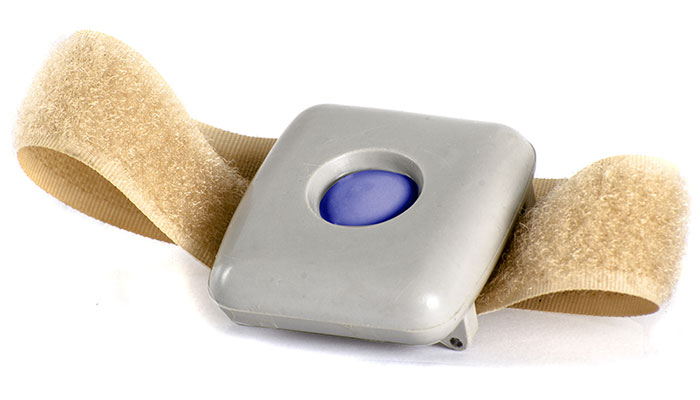Learn more at AgingWellMetroDC.com
Our Monthly Newsletter
Helpful tips for family caregivers
July/August 2019 Print
This month we explore the strategy of “therapeutic fibbing.” Rather than push a loved one with dementia to accept our reality, sometimes it’s simply kinder to jump into theirs. On a different tack, we also look at ways to make the best of a dreaded circumstance: when your loved one receives a life-threatening diagnosis. And last, we offer tips for choosing a personal emergency response system. One size does not fit all.
"Lie to my mom?"
 Mom taught you to always tell the truth.
Mom taught you to always tell the truth.
But in the context of caring for someone with memory loss (dementia), honesty may not always be the best policy.
There may be times when the kindest strategy—the one that reduces your loved one’s anxiety or fear—is to omit the truth or bend it a little.
When your loved one is distressed: Therapeutic fibbing
Try distraction first. Put your relative’s forgetfulness to work for you by focusing his or her attention on something else. For instance, if your dad is persistently asking to see his mother, don’t bother explaining that she died decades ago. Instead, validate his emotions and meet him in his memories. “You want to see your mother. Tell me about your mother.” Shortly, change the subject, even move to a different room. Then lead his attention to a favorite activity.
Bend the truth. If distraction doesn’t engage his attention, you might say, “Your mother is visiting her sister and will come see you tomorrow.” Or, if he wants to drive to the store, rather than reminding him that he can’t drive and the car was sold, say, “The car is in the shop, Dad. It should be back tomorrow.”
Omit the truth. If mom gets fretful about going to the doctor, consider: Does she need to know that that’s where she’s going? Perhaps instead, go to lunch and then “happen” to stop by the doctor’s on the way back. Was anything—other than her anxiety—lost in her not knowing ahead of time?
Therapeutic fibbing may not immediately appeal to you. Simply know it is a proven technique for relieving distress and bringing a confused loved one back to a state of tranquility. The underlying principle is that your relative benefits more from feeling safe and calm than from knowing “the truth.”
Return to topBad news
 If a person you care for receives a serious diagnosis, it can feel like a gut punch—for everyone in the family. There is no way to sugarcoat such a reality. There are ways, however, to make the emotional journey less traumatic.
If a person you care for receives a serious diagnosis, it can feel like a gut punch—for everyone in the family. There is no way to sugarcoat such a reality. There are ways, however, to make the emotional journey less traumatic.
Grief AND joy
Even if your loved one has only months or weeks to live, laughter still happens. It’s not wrong or disrespectful to watch a funny movie or share silly memories. Your emotional roller coaster will include highs as well as lows. Celebrate joy when it’s at the forefront.
When is action needed?
After the initial diagnosis, encourage your loved one to pause before making big decisions. Even with cancer, waiting 2-3 weeks does not usually result in a worse outcome. Ask the doctor to be specific about urgency.
Common emotions
You may have heard of the “stages of grief.” It is not really a linear progression. Rather, for you and your family member, a variety of emotions may come and go, and come again. Here are some tips:
- Anger. Blame, even “justified”—he smoked; she drank—does not reduce the person’s need for comfort and love. Leave anger and blame, including self-blame, at the door.
- Denial. If your relative is minimizing the seriousness yet still moving forward with a plan, don’t push “a dose of reality.”
- Depression. With an incurable illness, hope changes over time. First, hope may be for a cure. Later, hope may revolve around visits with loved ones. Eventually, it focuses on comfort. If the person you care for expresses an ongoing sense of hopelessness, he or she may be depressed. While that might seem “normal under the circumstances,” depression should be addressed. Talk with the doctor. The illness may not be curable, but the discomfort of depression may be eased with counseling or medication.
Personal emergency response systems
A personal emergency response system (PERS) can provide peace of mind if the person you care for lives alone. There are many factors to consider when shopping for a device.
The need for a personal call button. Is your loved one at risk of a fall or heart attack? If so, you’ll want 24/7 emergency help. Or are you looking for backup for nonemergency situations: a car breakdown or home alone and not feeling safe?
Who receives the alert?
- A professional on duty 24/7. Push the button and a human being answers. By arrangement, the professional at the other end of the line has access to your loved one’s medical history. He or she also knows who to call and in what order.
- An automated response. You choose among three possibilities: direct to 911 (your loved one may hesitate to push the button), direct to a prearranged contact person (who may or may not be available), trigger a phone tree of people to be automatically called (if no one answers, the system alerts 911).
Where it works
- Home use only. Good for the homebound.
- Home and away from home. Typically, these require a strong cell signal. If your loved one lives in a rural area, this type may not be a wise choice.
How easy is it to use?
- Charging frequency. Does the system require a regular habit of charging every night? Is that realistic?
- Practice is required! It’s not at all intuitive to the person using the device for the first time or two. Ask for a trial run and practice regularly after the purchase.
How ugly or obvious is it? Looks are important! If your relative doesn’t like it, he or she won’t wear it, and that defeats the purpose. Get your loved one’s thumbs up before making a final decision.
